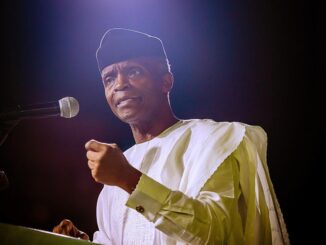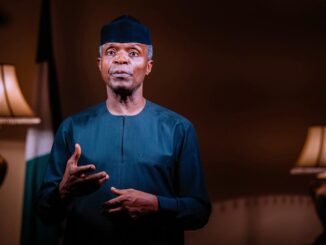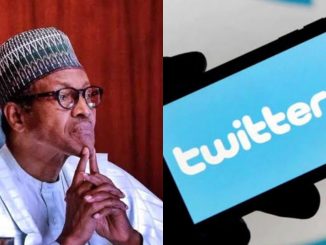
By Gideon Maxwell
March 27, 2025
Former Senator and presidential adviser, Babafemi Ojudu, has delivered a pointed critique of Nigeria’s political culture, warning that uncritical loyalty among followers is as damaging as poor leadership.
Speaking on Thursday, at the 1st Annual Conference on Followership Studies in Africa, held virtually, Ojudu emphasised that the nation’s focus on leadership has overshadowed the crucial role of followership in shaping democracy.
He queried, “Across the globe, the obsession has always been with leadership. But who is studying followership? Why do we assume that the fate of nations rests solely in the hands of leaders, when in reality, a society often reflects the quality of its followership?”
He contrasted responsible followership with blind allegiance, which he described as undermining national development.
“Followership is active, thoughtful, and engaged. It demands accountability, asks questions, and prizes principle over personality.
“Followersheep, by contrast, is passive, blind, sycophantic. It clings to individuals rather than ideas. One builds nations. The other erodes them, quietly, steadily, and often with a smile,” Ojudu said.
Drawing from his personal experiences, Ojudu recounted how his efforts to hold leaders accountable, both as a journalist and a politician, were met with resistance, not just from those in power, but from citizens who took any criticism of their leaders as a personal attack.
“I wrote stories to hold leaders accountable, and I was met not just with resistance from those in power, but with hostility from ordinary citizens who felt I had ‘insulted their leader.’”
He cited a recent example where his open letter to a former Kaduna State governor urging political reform was well received, only for him to face backlash days later for criticising the President’s suspension of democratic structures in Rivers State.
ALSO READ: Osinbajo better for Nigeria than Tinubu as president, Buhari didn’t back him — Ojudu
“The message was clear: ‘We want truth, but only when it serves our tribe.’ Truth became offensive. Facts were dismissed as bias. Sycophancy was mistaken for loyalty.”
Reflecting on his time in the Senate, Ojudu spoke about the expectations placed on politicians to provide personal benefits rather than champion policies and reforms.
“In 1996, my grandmother, before her death at 97, gave me receipts of her contributions to Chief Obafemi Awolowo’s Action Group. She didn’t expect contracts or favours, she contributed out of principle.”
He contrasted this with his own political journey.
“I had to pay people to attend meetings, feed them, give them souvenirs. After winning, the demands only grew: sponsoring weddings and burials, roofing houses, paying hospital bills. I had become, to them, an ATM,” Ojudu said.
Even in the Senate, he said, standing against corruption often meant standing alone.
“They wanted silence, not substance.”
Ojudu also spoke about his time as a presidential adviser, noting how truth-telling was often discouraged.
“Truth-telling earned labels: ‘disloyal,’ ‘too bold,’ ‘not a team player.’ These accusations didn’t always come from leaders, but from fellow followers who had traded their conscience for access.”
He warned of the dangers of blind loyalty.
“As the writer James Baldwin warned, ‘Ignorance, allied with power, is the most ferocious enemy justice can have.’ But I would add: when ignorance is paired with loyalty, it becomes even more dangerous.”
Calling for a shift in civic engagement, Ojudu said Nigeria’s democratic future depends on active and informed citizens.
“We must reimagine followership, one grounded in critical thinking, civic responsibility, and national interest.”
He outlined the necessary steps for change, stating, “Asking why before asking who. Choosing issues over personalities. Rewarding courage, not flattery. Building platforms where ordinary citizens can become extraordinary participants in governance.”
“The follower who thinks, questions, and holds power accountable is the most powerful force in a democracy.”
Closing his speech, Ojudu challenged Nigerians to reflect on their role in governance.
“Are you a follower or a followersheep? Are you thinking, or just cheering? Are you defending peoplez or defending principles?”
He ended with a reflection on his 64th birthday, which is coincidentally today, proposing the establishment of an Institute of Followership in Ekiti State to promote civic education and responsible citizenship.
“That, to me, would be a far greater legacy than holding office. It would be a gift to our democracy, and perhaps,
the most meaningful birthday gift I could give myself.”




